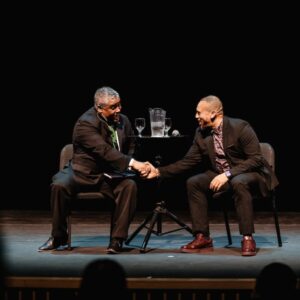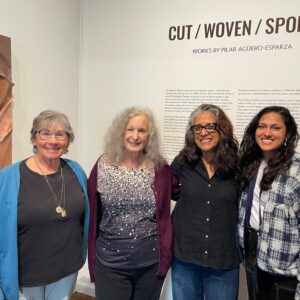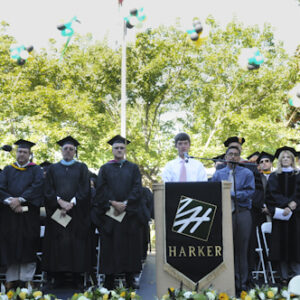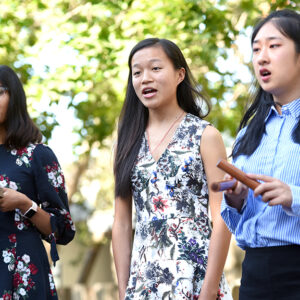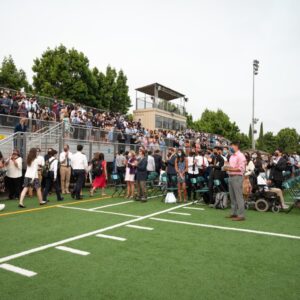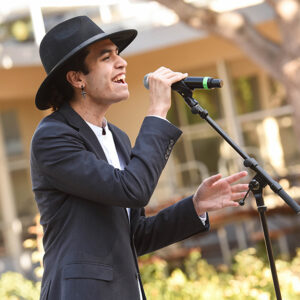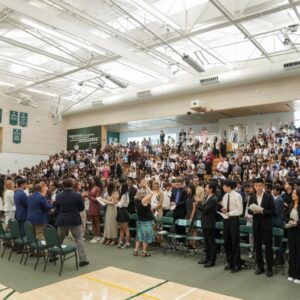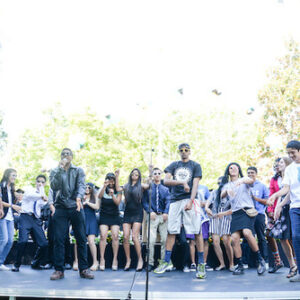This article originally appeared in the fall 2010 Harker Quarterly.
Good morning. I’d like to welcome the Board of Trustees, administration, faculty and staff, and the classes of 2014, 2013, 2012 and 2011 to the Matriculation ceremony. I am honored to have the opportunity to open the new academic year with this Matriculation address, and I am sure you will be relieved to hear that I am continuing the tradition of brevity. Typically I deliver a two-page address at Matriculation; this year I am cutting back to one page of single spaced, size 12 font. At this rate, by the time I retire, I will be delivering one-word addresses, like “love” or “cheesecake.”
I would like to reflect upon the fact that an important group is not present today. The tradition of not inviting parents to Matriculation goes back to the founding of The Harker Upper School over a decade ago. When the school conceived of a Matriculation ceremony, during which the student body binds itself to common values by oath, parents were purposely left out. First, we didn’t have room for them. But secondly, I believe, we wanted you to commit to these values freely, and we wanted your commitment to wholly represent your will and no one else’s.
Now I know that some of you, perhaps many of you, most likely do not feel that you are here freely, but the truth is you are. Each and every one of you has the freedom not to participate. Yes, there would be consequences. We all can imagine Mr. Williamson chasing you over fences and across highways. But the presence of a consequence does not mean that you are not free to act. You are also free not to participate with your heart. Many of our greatest thinkers like Thoreau, Gandhi and King purposely broke laws and by doing so incurred severe consequences to highlight the immorality of the laws. They called this civil disobedience.
However, as excruciating as it is to listen to me, I hope that doing so does not call for civil disobedience. Now that we have established that you have free will, and that you can exercise that will even if the exercise thereof brings consequences, why do we care? I would argue that having free will is an exclusively human attribute. It separates us from the animals. Sure, there are glimpses of free will in the animal kingdom – an eagle choosing to soar above the mountaintops for instance – but most of the time animals respond to instinct.
Humans respond to instinct too, probably much more than we’d like to admit. But we don’t have to. Last year I spoke from this podium about academic integrity. I received some criticism, mostly deserved, for beginning the year on a sour note. But I learned through discussions with students, teachers and administrators that the community did not want to be defined by the poor decisions of a few. Last year saw, among other accomplishments, Paul Melendez of the University of Arizona’s High School Ethics Forum extend an invitation for that event to Harker students, the only out-of-state invitees at the forum. We are also proud to announce that the Council for Spiritual and Ethical Education will hold a conference at The Harker School in February of 2011 titled “Honor Codes and Councils: From Nuts and Bolts to a Finely-Tuned System.”
These achievements do not mean that we have solved the problem of cheating in schools. Allan Meltzer, professor of political economy at Carnegie Mellon, said, “Capitalism without failure is like religion without sin.” We could say the same of high level academics and some form of cheating. But this is not to be complacent, and you as a community have chosen action over complacence.
I remember specifically one young lady telling me that students want to be informed of any problem in the community so that they can address it directly. She said that the students care about the community and want to protect it.
Which brings me back to free will and the absence of parents. You are taking an oath today, hopefully of your own accord, to bind yourself to the values of this community. You will carry that oath around with you in the upper school student handbook and planner, or at least two or three of you will. Your signature will be on display at the front of the upper school office. You will have many assignments in your academic career that you simply want to finish. I hope that taking this oath is not one of them.
One of my favorite stories comes from Arthurian legend as interpreted by the mythologist Joseph Campbell. The knights are charged with finding the Holy Grail, which symbolizes spiritual wealth, in the forests surrounding Camelot. The knights learn that they cannot find the Grail as a group; rather, each knight has to enter the woods alone where there is no path and find the Grail for himself. My father-in-law reminds me that as a parent I can do many things for my children, but I cannot live in their shoes. We are taking the oath today as a group, but each of you is beginning a journey that is uniquely of your making. You will enter the woods alone, without parents, friends, teachers, and we hope that you are taking this journey of your own free will. It is by following your path alone that you find the entire world. Thank you.



